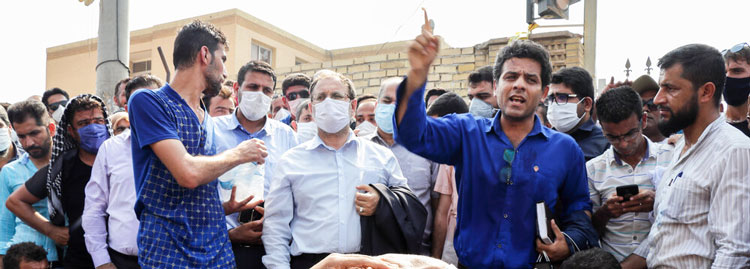Thousands of factory workers at the Haft Tappeh Sugar Cane Company in Iran have been on strike since June 12 demanding months of back wages.
The strike is the latest in a number of walkouts Haft Tappeh workers have been forced to conduct to get paid over the last five years. They are organizing marches and rallies to voice their demands. The plant is located in Shush, in the oil-rich Khuzestan province near the border with Iraq.
In recent weeks, their battle has been joined by strikes and mobilizations by workers in Iran’s natural gas fields, coal mines, government offices and beyond who are also demanding back pay, as well as an end to unhealthy and dangerous job conditions. News of these other battles has been largely suppressed in Iran, with little if any mention in the bourgeois news media.
The Haft Tappeh sugar cane workers strike, however, has become national news.
The company, previously government-owned, was privatized in 2015. One of the current owners, Omid Asadbeigi, is now in and out of jail on charges of organizing “unauthorized foreign exchange manipulations.” The company’s assets have been frozen by the regime. The size of the strike, the perseverance of the workers, and the rulers’ fear that it could be generalized are putting pressure on the capitalist government.
According to the Iranian Students New Agency, three members of Iran’s parliament traveled to meet with the striking workers Aug. 1. ISNA reported that Deputy Ali Khazarian told a workers rally that “as a first urgent step, the parliament must force the government to pay the wages owed to the workers.” The government must then remove the new management, he said.
The semiofficial Mehr News Agency reported that another deputy, Ahmad Naderi, said, “It is not becoming of us, because of privatization, to hold off three months back pay to more than 5,000 workers, declaring that the government doesn’t have the budget for it.”
All major dailies and new agencies have voiced support for the workers. These include Fars and Tasnim news agencies, which are formally independent but have links with the Revolutionary Guard Corps.
While the members of parliament were talking with the workers, a representative of the strikers spoke to Fars News Agency on the side, with other workers gathered around him. What he said was recorded, and Fars broadcast a video clip the next day. The workers representative, whose name wasn’t given, spoke of the hardships the workers and their families are confronting in the face of rising inflation. He said this has been going on for the last four or five years.
“In the name of the ‘private sector,’ they are robbing the entire country,” the worker said. “All they are giving us are promises.” The workers — not managers or state officials — are producing the sugar for the country, he said. Yet the stomachs of their children and families are empty. He noted that only after the strike had been underway for 49 days had members of parliament come to Shush.
The faction in the regime associated with the Revolutionary Guard and Iran’s Supreme Leader Ali Khamenei is seeking to turn to its own advantage the attention the strike has won. It hopes to deal further blows to its rivals linked with President Hassan Rouhani, who have been tied to corrupt privatization deals and resulting layoffs and unpaid wages.
Hojjatislam Mousavi Fard, Khamenei’s representative in the Khuzestan province, spoke to a gathering of Haft Tappeh sugar workers Aug. 8, saying that “the elected president of Iran, who has revenues from oil and other resources under his control, must solve the country’s problems.” He blamed the province’s “weak” governor, appointed by Rouhani, for “factory after factory being shut down,” as well as the acute water shortage that afflicts working people in the region, especially farmers.
Mousavi Fard asked workers for a three-month grace period to resolve the issues at the factory. The workers’ unpaid wages and other rights must be addressed, he said. And the Haft Tappeh company must either be returned to the government, or “powerful organs, such as the Revolutionary Guard,” must take it over.
In parliamentary elections in February, Khamenei’s backers succeeded in disqualifying most candidates who look to Rouhani and won an overwhelming majority.
Meanwhile, more than two months into their strike, the Haft Tappeh workers, whatever the political maneuvering of Iran’s divided rulers, remain determined to win their back wages and other demands.


